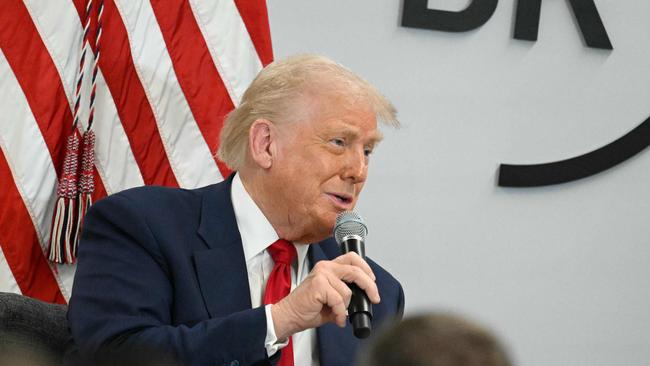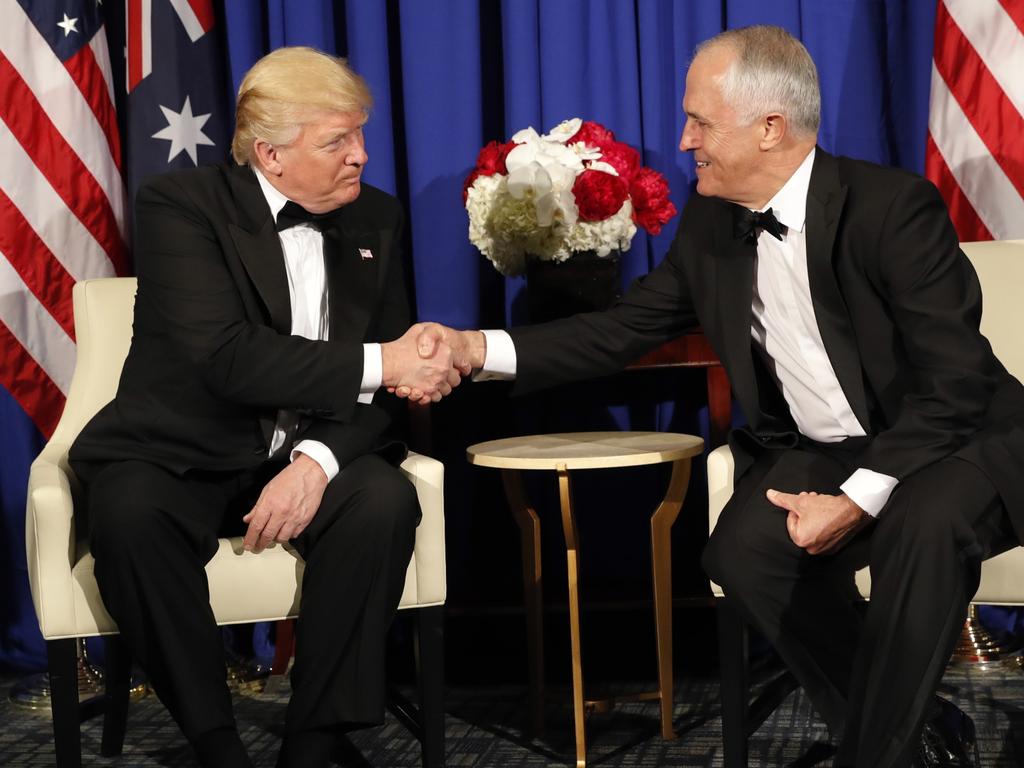Donald Trump unleashes trade tariffs on Australia; Albanese braces for second wave
Australia braces for more of Donald Trump’s tariffs as Anthony Albanese and his ministers slam ‘unjustified’ duties on steel and aluminium and suggest the nation’s critical minerals will be used in any future negotiations.
Australia is bracing for a second round of Donald Trump’s punishing tariffs as Anthony Albanese and his ministers slammed the “unjustified” duties on steel and aluminium, suggested the nation’s critical minerals will be used as a bargaining chip in any future negotiations and accused the US President of misleading the government.
Mr Trump swept aside the nations’ free-trade agreement and 74-year alliance to impose the 25 per cent tariffs, paving the way for further hits to key industrial sectors in the next phase of his global trade war.
A defensive Mr Albanese condemned the decision as an unfriendly act as it emerged Mr Trump refused to take his calls ahead of his tariff ruling on Wednesday. With an election campaign just weeks away, Peter Dutton seized on the government’s failure to win a carve-out from the tariffs, putting the result down to “weak and incompetent” leadership.
But a month after Mr Trump said he would give “great consideration” to Mr Albanese’s plea for an exemption, Trade Minister Don Farrell said Australia never had a chance.
“I don’t believe that there was any intention on the part of the United States government to give us an exemption,” Senator Farrell told Sky News.
Foreign Minister Penny Wong suggested that Australia’s critical minerals was used – and will be used in future – as a bargaining chip in White House negotiations late on Wednesday.
“Well, President Trump’s Administration has talked about the importance of critical minerals, talked about the strategic significance of that sector, and has talked about the importance of America gaining more secure domestic supply arrangements and changes to the global market on that,” she told the ABC.
“Now, Australia obviously is a country where we are blessed with many critical minerals. You would anticipate being as disciplined and as focused as we are, of course we listen to those signals.
“But you would anticipate that, of course, we looked at all the, all those things that the Trump Administration had indicated were of value.”
Amid whiplashing global markets and rising fears of a US recession, the ASX 200 closed down 1.3 per cent, bringing the index’s five-day fall to 4.36 per cent. On Wall Street, the Dow Jones Industrial Average fell 1.1 per cent, the S & P 500 lost 0.8 per cent and the Nasdaq Composite was down 0.2 per cent. All three indexes notched their worst two-day drop since August.
Trade experts warned the metals tariffs were just the opening salvo, and Australia now faced serious impacts from Mr Trump’s looming “reciprocal tariffs” and a broader “cycle of retaliation” between the US and its biggest training partners. Australian drug and agricultural sectors are among those likely to be targeted in the looming crackdown on non-tariff barriers following longstanding US grievances over the nation’s intellectual property rules, the Pharmaceutical Benefits Scheme, quarantine rules, and even the GST. As questions mounted over his own efforts to avert the tariff hit, Mr Albanese went on the attack, accusing Mr Trump of undermining the nations’ bilateral relationship.
“Such a decision by the Trump administration is entirely unjustified,” the Prime Minister said.
“This is against the spirit of our two nations’ enduring friendship, and fundamentally at odds with the benefits that our economic partnership has delivered over more than 70 years. Australia has no tariffs on goods from the United States and, of course, we have a free-trade agreement with the United States.”
Foreign Minister Penny Wong underscored the point, saying imposing tariffs was “not the way to treat a friend and partner”. Unlike Canada, which has stoked the President’s ire with tariffs on US imports, Mr Albanese said Australia would not retaliate. “Such a course of action would only push up prices for Australian consumers and increase inflation,” he said.

Despite his own decision not to fly to the US to plead Australia’s case, Mr Albanese said the government had “mobilised everything at our disposal” to try to avert the tariff hit. He said this included “continued” requests to secure a phone call with Mr Trump ahead of his tariff decision. A Labor source said a third phone call between the leaders was sought “in recent days” but the request was rebuffed.
Mr Dutton said the Prime Minister and Australia’s ambassador to the US, Kevin Rudd, “have had a shocker”.
“The Prime Minister can’t secure a phone call, let alone a meeting with the President of the United States,” the Opposition Leader said. “How on earth can an outcome be negotiated if the President won’t even take the Prime Minister’s call?
“So it’s not just Australians who see the Prime Minister as weak and incompetent, it’s our trading partners as well.”
He said there was “no question” in his mind that the Coalition would be able to secure an exemption from the tariffs if it won the election.
“I do believe that if there’s a change of government, that we will do a deal with the Trump administration,” Mr Dutton said.
The White House confirmed on Wednesday morning AEDT that Australia and other countries would not be spared from the steel and aluminium tariffs.
White House press secretary Karoline Leavitt told Australian media outlets: “He considered it, and considered against it. There will be no exemptions.”
Mr Trump’s trade adviser, Peter Navarro, said Australia was among a number of countries that had “abused” tariff exemptions granted by the Trump administration in 2018.
“So what the lesson from the first Trump tariffs has been is that exemptions to anybody are counter-productive. They don’t work for the American people,” he said.
Former Australian trade negotiator Justin Brown said the aluminium and steel tariffs were “not good news” for Australia, but the nation faced even more serious fallout from Mr Trump’s trade agenda in the weeks and months to come.
He said escalating tit-for-tat moves between the US, China, Canada and the EU would put a dampener on investment and generate movements of capital that could have dramatic and unpredictable impacts.
“Nobody really knows how bad it’s going to be, but it sure ain’t going to be good,” Mr Brown said.
The consequences for Australia as a major trade-exposed economy could be “very significant”, he said.
Mr Brown said Australia’s failure to secure an exemption meant exporters were now in the firing line for Mr Trump’s reciprocal tariffs to be implemented from April 2.
“Every country has non-tariff barriers. And of course, if the Americans are going to just unilaterally decide what is and isn’t a non-tariff barrier, then many things could become a focus of attention. “Once you start going down this burrow, the way the Americans see it, if you haven’t got a measure that is exactly the same as the US has, then they may decide that it’s an unfair barrier.”
The ANZ said the tariffs on steel and aluminium, which made up just 0.2 per cent of Australia’s exports to the US, would not adversely affect the economy. But it warned rising global trade tensions could have serious consequences.
“Australia is indirectly exposed to US tariffs through their impacts on key trading partners. Slower growth in China, for instance, would place downside risk to Australia’s exports,” it said.
“Australia is also indirectly exposed to impacts on major trading partners, through uncertainty affecting consumer and business decisions and the effect that will have on confidence.”
Business Council of Australia chief executive Bran Black warned of bumpy economic times to come.
“Australia should adopt a cool-headed response to this news and keep making the case for our interests through continued extensive engagement with the US Administration,“ he said.
“My primary concern is with the broader trade picture and the risk that lies ahead for our economy if a global contest of reciprocal tariffs were to escalate.”






To join the conversation, please log in. Don't have an account? Register
Join the conversation, you are commenting as Logout